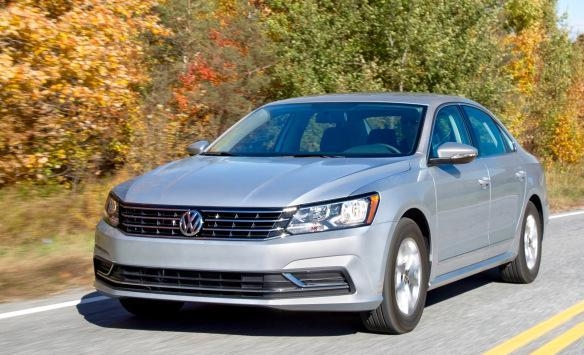VW’s bottom-rung Passat is great value

The Passat is the roomiest sedan that Volkswagen offers in the U.S., and not only has it been thoroughly “Americanized,” it is also built here — in Chattanooga, Tennessee. Volkswagen rolled out the first Passat back in 1973, making it older than many of the people who buy it today, and the 2016 version is its eighth generation.
However, the one we get — and that is also sold in Canada, South Korea, China and the Middle East — is, strictly speaking, the NMS. The New Model Sedan, that is, an internal moniker that VW uses to distinguish our car from the Euro Passat.
The differences are significant. The NMS Passat was designed to deliver a driving experience more in line with our tastes, and you know what this means: It’s bigger and the ride is softer.
Elsewhere, the five-seater-with-a-huge-trunk Passat qualifies as a large car; here, it’s midsize.
Nothing necessarily wrong with bigger and cushier — except for one not-minor “detail” — and since its U.S. debut as a 2012 model the new Passat has done well.
(By the way, one of my favorite VWs, the CC (for “Comfort Coupe”) is a slightly more deluxe Euro Passat reskinned with a stylishly swoopy coupe body that keeps its four doors. I don’t know why, but it’s far more popular over there than it is here.)
For 2016, our Passat sedan is available in three variations and eight trim levels, priced from about $23,000 to $38,000, with dual-clutch or torque-converter automatic transmissions and front-wheel drive. At the top, the swanky Passat SEL Premium gets a 280-horsepower V-6 engine and all of VW’s latest active safety systems.
But the car we’re driving is the entry-level 1.8T S, with a 1.8-liter turbo four — 180 horsepower on regular gas, and it feels like more — and the minimum in VW goodies. It’s no stripper, though. When I tried to guess the MSRP, based on initial impressions and without driving it, I was about seven grand too high.
Modern VWs are always beautifully finished and built, and these days the company is under tremendous pressure to deliver. (Dieselgate, remember? Government agencies, lawyers, judges and ticked-off buyers haven’t yet decided on VW’s punishment, but the marketplace is speaking and VW has its back to the wall. I’ve seen TV ads offering leftover Jettas for $99 per month.)
Adjusted for content, VW says, the 2016 Passat is a $1,315 “value enhancement” over last year’s car. I believe it; the 1.8T S feels like considerably more car than $23,000 normally buys. Except for that one un-minor detail I mentioned — the steering.
Its steering has been not so much Americanized as euthanized. We know the driver’s wheel is connected to the front wheels because turning the one makes the others change direction, eventually, but that’s about it for feedback. Very little effort is required to steer, and no data returns from the road back up to the driver’s hands.
Gravel? Pavement? Snow? Who knows? You get used to it, sort of, but it always remains a barrier between the driver and the car. The all-independent suspension may well be as competent and comfortable at autobahn speeds as it is on our highways, but with this fudgy steering no one’s ever likely to know.
The 1.8T S is the bottom-rung Passat, but (to mix metaphors) its cupboard is far from bare.
Tire-pressure monitors and a backup camera join the built-in passive safety equipment, and the camera sends its picture to a color touchscreen that also displays an AM/FM/CD player with six speakers. There’s a USB port and a Bluetooth phone link. Apple CarPlay, Android Auto and MirrorLink integration are available.
Heating and cooling is via an automatic climate-control system with two zones. The cruise-control switches are in the steering wheel, as are phone and stereo controls.
And from here only your paycheck is the limit. Forward Collision Warning and Autonomous Emergency Braking is standard on SE models and up. Higher trim levels get passive blind-spot monitors and rear-traffic alert. And Active Lane Departure Warning, along with Active Blind Spot Monitoring with corrective steering, is standard on the SEL Premium.
As an alternative to the Camry and Accord, the Passat is worth a close look, and some drivers may regard its no-effort steering as an asset.